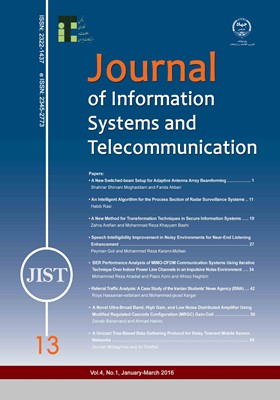A Unicast Tree-Based Data Gathering Protocol for Delay Tolerant Mobile Sensor Networks
محورهای موضوعی : Wireless Network
Zeynab Mottaginia
1
,
Ali Ghaffari
2
![]()
1 - Payam Noor University
2 - Azad Eslami, Tabriz Branch
کلید واژه: Delay-Tolerant Mobile Sensor Networks (DTMSNs) , Unicast Tree-based Data Gathering protocol (UTDG) , Transmission Ranking , Contact Probability , Link Expiration Time,
چکیده مقاله :
The Delay Tolerant Mobile Sensor Networks (DTMSNs) distinguish themselves from conventional sensor networks by means of some features such as loose connectivity, node mobility, and delay tolerability. It needs to be acknowledged that traditional end-to-end routing protocols cannot be applied usefully in such challenging network conditions because of intermittent connections and/or long delays. Hence, this research is intended to propose a Unicast Tree-based Data Gathering protocol (UTDG) to resolve this problem. A UTDG includes 3 phases: tree formation phase, data collection and data transmission phase, and finally the updating phase. The proposed protocol constructs a tree in each community on the basis of transmission ranking, contact probability and the link expiration time. The selection of the next-hop node is based on the tree structure rather than forwarding the message to the neighbor node directly. Each node unicasts the data to its parent in the related community, and the root of the tree successively sends the data to the sink node. The authors contend, based on the simulation results of the study, that the proposed protocol can gain significantly higher message delivery rates with lower transmission overhead and also lower delay in data delivery than the other existing DTMSNs routing protocols in some applications.
The Delay Tolerant Mobile Sensor Networks (DTMSNs) distinguish themselves from conventional sensor networks by means of some features such as loose connectivity, node mobility, and delay tolerability. It needs to be acknowledged that traditional end-to-end routing protocols cannot be applied usefully in such challenging network conditions because of intermittent connections and/or long delays. Hence, this research is intended to propose a Unicast Tree-based Data Gathering protocol (UTDG) to resolve this problem. A UTDG includes 3 phases: tree formation phase, data collection and data transmission phase, and finally the updating phase. The proposed protocol constructs a tree in each community on the basis of transmission ranking, contact probability and the link expiration time. The selection of the next-hop node is based on the tree structure rather than forwarding the message to the neighbor node directly. Each node unicasts the data to its parent in the related community, and the root of the tree successively sends the data to the sink node. The authors contend, based on the simulation results of the study, that the proposed protocol can gain significantly higher message delivery rates with lower transmission overhead and also lower delay in data delivery than the other existing DTMSNs routing protocols in some applications.


